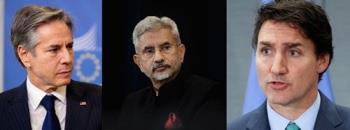In a significant and diplomatic development, India’s Foreign Minister, Mr. Jaishankar, has accused Canada of maintaining a “permissive attitude towards terrorists, extremists, and people who openly advocate violence.” These remarks were made during a discussion at the Hudson Institute in Washington, D.C.
Mr. Jaishankar expressed concerns that certain individuals with extremist views have been allowed to operate within Canada due to the complexities of Canadian politics. This statement raises questions about Canada’s approach to handling individuals associated with extremist ideologies and organizations.
The Foreign Minister’s remarks come in response to Canadian Prime Minister Justin Trudeau’s previous allegation that “Indian government agents” were involved in the killing of Hardeep Singh Nijjar. Mr. Jaishankar clarified that Trudeau’s accusations were not consistent with India’s official policy, emphasizing India’s rejection of the charges as “absurd.”
These recent statements from both Indian and Canadian officials highlight the complexities surrounding bilateral relations and the ongoing diplomatic discussions between the two nations. This situation is likely to prompt further scrutiny of Canada’s approach to handling extremism and its impact on international relations.
